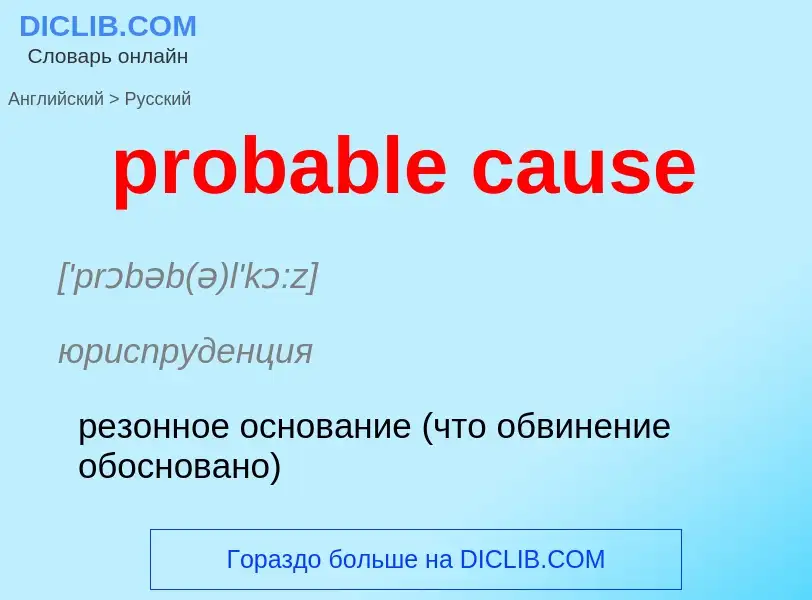Translation and analysis of words by ChatGPT artificial intelligence
On this page you can get a detailed analysis of a word or phrase, produced by the best artificial intelligence technology to date:
- how the word is used
- frequency of use
- it is used more often in oral or written speech
- word translation options
- usage examples (several phrases with translation)
- etymology
probable cause - translation to russian
['prɔbəb(ə)l'kɔ:z]
юриспруденция
резонное основание (что обвинение обосновано)
математика
вероятная причина
общая лексика
предварительное следствие
Definition
Wikipedia
In United States criminal law, probable cause is the standard by which police authorities have reason to obtain a warrant for the arrest of a suspected criminal or the issuing of a search warrant. There is no universally accepted definition or formulation for probable cause. One traditional definition, which comes from the U.S. Supreme Court's 1964 decision Beck v. Ohio, is when "whether at [the moment of arrest] the facts and circumstances within [an officer's] knowledge and of which they had reasonably trustworthy information [are] sufficient to warrant a prudent [person] in believing that [a suspect] had committed or was committing an offense."
It is also the standard by which grand juries issue criminal indictments. The principle behind the standard is to limit the power of authorities to perform random or abusive searches (unlawful search and seizure), and to promote lawful evidence gathering and procedural form during criminal arrest and prosecution. The standard also applies to personal or property searches.
The term comes from the Fourth Amendment of the United States Constitution:
The right of the people to be secure in their persons, houses, papers, and effects, against unreasonable searches and seizures, shall not be violated, and no Warrants shall issue, but upon probable cause, supported by Oath or affirmation, and particularly describing the place to be searched, and the persons or things to be seized.
Probable in this case may relate to statistical probability or to a general standard of common behavior and customs. The context of the word probable here is not exclusive to community standards, and could partially derive from its use in formal mathematical statistics as some have suggested; but cf. probō, Latin etymology.
In U.S. immigration proceedings, the “reason to believe” standard has been interpreted as equivalent to probable cause.
Probable cause should not be confused with reasonable suspicion, which is the required criteria to perform a Terry stop in the United States of America. The criteria for reasonable suspicion are less strict than those for probable cause.


![The first page of the [[Constitution of the United States]] The first page of the [[Constitution of the United States]]](https://commons.wikimedia.org/wiki/Special:FilePath/Constitution of the United States WDL2708.jpg?width=200)
